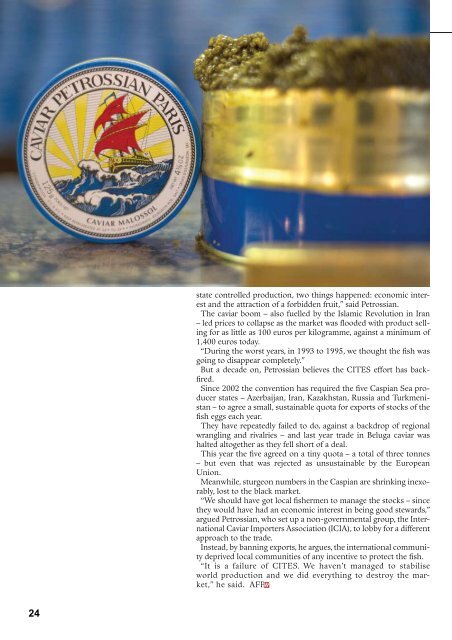Weekend® - Macau Daily Times
Weekend® - Macau Daily Times
Weekend® - Macau Daily Times
Create successful ePaper yourself
Turn your PDF publications into a flip-book with our unique Google optimized e-Paper software.
Weekend <strong>Times</strong><br />
24<br />
Caviar at the Armen<br />
Petrossian’s shop, the<br />
world’s leading distributor<br />
of caviar, in Paris<br />
state controlled production, two things happened: economic interest<br />
and the attraction of a forbidden fruit,” said Petrossian.<br />
the caviar boom – also fuelled by the islamic revolution in iran<br />
– led prices to collapse as the market was flooded with product selling<br />
for as little as 100 euros per kilogramme, against a minimum of<br />
1,400 euros today.<br />
“During the worst years, in 1993 to 1995, we thought the fish was<br />
going to disappear completely.”<br />
But a decade on, Petrossian believes the CitEs effort has backfired.<br />
since 2002 the convention has required the five Caspian sea producer<br />
states – azerbaijan, iran, Kazakhstan, russia and turkmenistan<br />
– to agree a small, sustainable quota for exports of stocks of the<br />
fish eggs each year.<br />
they have repeatedly failed to do, against a backdrop of regional<br />
wrangling and rivalries – and last year trade in Beluga caviar was<br />
halted altogether as they fell short of a deal.<br />
this year the five agreed on a tiny quota – a total of three tonnes<br />
– but even that was rejected as unsustainable by the European<br />
Union.<br />
meanwhile, sturgeon numbers in the Caspian are shrinking inexorably,<br />
lost to the black market.<br />
“We should have got local fishermen to manage the stocks – since<br />
they would have had an economic interest in being good stewards,”<br />
argued Petrossian, who set up a non-governmental group, the international<br />
Caviar importers association (iCia), to lobby for a different<br />
approach to the trade.<br />
instead, by banning exports, he argues, the international community<br />
deprived local communities of any incentive to protect the fish.<br />
“it is a failure of CitEs. We haven’t managed to stabilise<br />
world production and we did everything to destroy the market,”<br />
he said. aFPW




